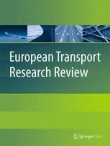European Transport Research Review (ETRR) is a peer-reviewed open access journal publishing original high-quality scholarly research and developments in areas related to transportation science, technologies, policy and practice. Established in 2008 by the European Conference of Transport Research Institutes (ECTRI), the Journal provides researchers and practitioners around the world with an authoritative forum for the dissemination and critical discussion of new ideas and methodologies that originate in, or are of special interest to, the European transport research community. The journal is unique in its field, as it covers all modes of transport and addresses both the engineering and the social science perspective, offering a truly multidisciplinary platform for researchers, practitioners, engineers and policymakers. ETRR is aimed at a readership including researchers, practitioners in the design and operation of transportation systems, and policymakers at the international, national, regional and local levels.
ETRR covers the following main areas of interest:
- Mobility and travel behavior
- Transportation safety and security
- Transportation economics
- Transportation planning and policy
- Human factors in transportation
- Traffic and demand management
- Intelligent Transportation Systems (ITS)
- Freight transport and logistics
- Air and waterway transport
- Transportation impacts of emerging vehicle technologies
- Environmental issues in transportation and climate change
- Equity, social and health issues related to transport
Examples of particular topics of interest are: urban logistics, intermodal transport systems, transitions towards sustainable transport, accessibility and equity analysis, technologies for improving network and vehicle efficiency, advances in integrated transport systems and intermodal transportation, traffic safety analysis, traffic flow theory and modeling, IT technologies for transport data collection and analysis, strategies for vehicle-to-vehicle communications and the transport impacts and indirect impacts of autonomous vehicles.
ETRR does not publish papers which focus purely on (road/rail) infrastructure technology, vehicle technology or information technology, but we welcome papers on the transport system impacts (e.g. improving network or vehicle efficiency) and/or policy impacts/implications of various (vehicle/infrastructure/information) technological developments.
The Journal encourages thematic collections of related articles from major European transport research projects, major conferences such as the TRA, ETC and WCTR, and international networks such as NECTAR.
ETRR aims to disseminate and discuss new ideas and methodologies that originate in, or are of special interest to, the European transport research community. While its focus is on Europe, it will be of interest to anyone wishing to learn from European experience or to develop new applications for European practice. We consider papers on non-European case studies if the relevance for the European transportation research field is sufficiently made clear.



